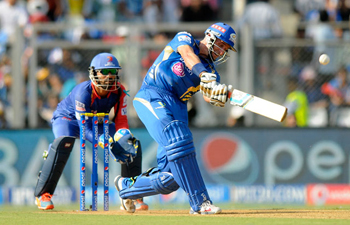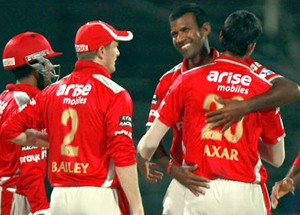
Eight wickets for 33 runs. And yet, Mumbai won, and comfortably at that. They did just about enough either side of the collapse to keep their hopes alive.
Michael Hussey got them off to a flier with a 33-ball 56, and Mumbai had been looking at 200 before their innings came crashing down. Chasing 174, Delhi Daredevils never got any real momentum going. JP Duminy and Manoj Tiwary kept them alive with an 85-run fourth-wicket partnership, but 32 from the last two overs proved beyond their reach. Marchant de Lange and Jasprit Bumhah bowled two excellent overs to close out a 15-run win for Mumbai. Sent in to bat, Mumbai profited from some ordinary bowling at the start to run away to 65 for no loss at the end of the Powerplay and 100 for 1 after 10 overs. Siddarth Kaul and Jaydev Unadkat kept drifting down leg to Hussey, and he kept playing pick-up shots and pulls into the gaps on the leg-side boundary.
Imran Tahir's introduction did nothing to slow Mumbai down. On the contrary, it brought Lendl Simmons into the game. He took three fours off the over, two with his favourite square cut - off back foot and then front foot - to capitalise on the width offered by the legspinner.
The dismissal of Simmons brought Rohit Sharma in, and he was soon capitalising on some width of his own - this time offered by JP Duminy, who bowled short and wide despite having only deep cover on the off-side boundary. Mumbai were going at close to 10 an over, and even the first few wickets didn't slow them down. Kieron Pollard hit the first ball he faced for six. Aditya Tare caressed the first two balls he faced to the off-side boundary.
The slide really began when Ambati Rayudu picked out long-off off Shahbaz Nadeem, and soon batsmen were holing out and running themselves out all over the place. Mumbai didn't even play out their full 20 overs. On this pitch, a target of 174 didn't look like all that much.
But Daredevils, as they have so often done this season, batted pretty well without ever giving their opponents a real scare. They got off the blocks quickly enough, with Kevin Pietersen striking three fours off de Lange in the second over of the chase, and were 43 for no loss after five overs. The next five overs, however, brought them only 19 runs and saw them lose three wickets.
Shreyas Gopal had M Vijay stumped with an enticingly loopy legbreak that the batsman flailed at and missed, but the bowlers didn't have to do too much to earn the next two wickets. Pietersen was bowled trying to switch-hit Harbhajan; Dinesh Karthik was bowled trying to scoop a full, straight ball from de Lange.
Daredevils were left needing 112 from their last 10 overs. They stayed in the hunt, with Duminy clinical in targeting the midwicket area, and Tiwary getting into good positions against the spinners to slog-sweep or hit inside-out. When de Lange started the penultimate over by giving away two free runs with a chest-high full-toss to Duminy, it looked like Mumbai could come to regret their batting meltdown.
But de Lange quickly recalibrated his radar, and found the blockhole three times out of the next six balls. He also dismissed Duminy, and 30 off 12 balls became 25 off six. There was still an outside chance, but Jasprit Bumrah quickly snuffed that out with some yorkers of his own. Mumbai hadn't been at their best, and had put themselves in some extremely sticky spots, but they were still breathing, just about, at the end of it.
Scoreboard
MUMBAI:
LMP Simmons c Parnell b Imran Tahir 35
MEK Hussey run out 56
RG Sharma b Unadkat 30
KA Pollard c Karthik b Unadkat 11
AT Rayudu c Vijay b Nadeem 2
AP Tare c Jadhav b Imran 14
Harbhajan c Vijay b Parnell 2
S Gopal run out 11
M de Lange c Karthik b Imran 1
PP Ojha run out 2
JJ Bumrah not out 0
EXTRAS: (lb 6, w 3) 9
TOTAL: (all out; 19.3 overs) 173
FOW: 1-87, 2-120, 3-140, 4-141, 5-151, 6-157, 7-161, 8-168, 9-171, 10-173
BOWLING: WD Parnell 3.3-0-26-1, S Kaul 2-0-21-0, JD Unadkat 2-0-24-2, S Nadeem 4-0-28-1, JP Duminy 4-0-31-0, Imran Tahir 4-0-37-3
DELHI:
M Vijay st Tare b Gopal 8
KP Pietersen b Harbhajan 44
KD Karthik b de Lange 7
MK Tiwary c Hussey b de Lange 41
JP Duminy not out 45
KM Jadhav not out 7
EXTRAS: (lb 3, w 2, nb 1) 6
TOTAL: (4 wickets; 20 overs) 158
FOW: 1-43, 2-59, 3-61, 4-146
BOWLING: JJ Bumrah 4-0-36-0, M de Lange 4-0-32-2, PP Ojha 4-0-33-0, S Gopal 3-0-20-1, Harbhajan Singh 4-0-30-1, KA Pollard 1-0-4-0
TOSS: Delhi
UMPIRES: S Ravi, RJ Tucker (Aus)
TV UMPIRE: K Srinath
MATCH REFEREE: AJ Pycroft (Zim)
Rajasthan Royals lose to Kings XI Punjab; race for final IPL 2014 playoffs spot still on
 Mohali, May 24: Rajasthan Royals‘ batsmen never got going, while chasing down a target of 180 runs against Kings XI Punjab in Indian Premier League (IPL) 2014. They finally ended up with 163 runs for the loss of eight wickets on the board. Sanju Samson compiled a knock of 30 runs for Rajasthan, but even he struggled for timing and placement.
Mohali, May 24: Rajasthan Royals‘ batsmen never got going, while chasing down a target of 180 runs against Kings XI Punjab in Indian Premier League (IPL) 2014. They finally ended up with 163 runs for the loss of eight wickets on the board. Sanju Samson compiled a knock of 30 runs for Rajasthan, but even he struggled for timing and placement.
For Punjab, Rishi Dhawan took two wickets in two balls and that too of key players in the opposition ranks; Shane Watson and Ajinkya Rahane. It was interesting to see that Brad Hodge, the experienced campaigner came to bat so late down the order. He did play well and made 31, but he had too much to do. It has to be remembered that Rajasthan needed to win this game to qualify for playoffs. They are still in the reckoning to qualify for playoffs though.
When Punjab were batting, despite losing wickets at regular intervals batsmen played with fearless courage during the early part of their innings in IPL 2014. Rajasthan bowlers did make a fine comeback in the middle overs, but George Bailey and David Miller with their pyrotechnics in the end overs helped them to a score of 179 runs for the loss of four wickets on the board.
It was Virender Sehwag, who gave them a flying start by smashing Vikramjeet Malik’s medium pace bowling all over the park. He finally got out to the all-rounder James Faulkner‘s bowling caught by Malik. Manan Vohra took over from him by playing sparkling shots himself. The way he stood tall at the crease to smash Shane Watson with a flick shot between wide long on and deep mid-wicket region just gave a glimpse of his talent. He though was run out just when it seemed like he was about to get a big score. He was run out with him not even grounding the bat.
It was then Shaun Marsh, the left-handed batsman who showed his ability to time and place the ball into gaps. The way he stepped out of the crease to cleanly strike Rahul Tewatia for a six was perhaps shot of the day. Unfortunately for him, he lost his wicket to Vikramjit’s Malik for a well made innings of 40 off 35 balls. To make it worse for him, as soon as he got out play was stopped due to rain. Once Marsh got out, David Miller the left-handed batsman known for playing eye-catching shots came into bat. For Rajasthan, their bowlers generally bowled with decent control. James Faulkner, the all-rounder though came in for some severe punishment.
Earlier, Rajasthan won the toss and elected to bowl in their crucial game against table toppers, Punjab in IPL 2014. Sehwag and Vohra opened the batting for Punjab. It was Malik who opened the bowling for Rajasthan. Sehwag though, showed his class by clouting Malik through the off-side for a boundary.
Sehwag continued on his merry way by clouting again through backward point for a boundary. He ended the over with another six off Malik’s bowling. A fine start by Punjab for sure. Skipper Shane Watson bowled the second over of the game. Manan Vohra joined the fun by smashing a boundary as well, off Watson’s bowling.
It made Watson think, and he bowled a fine bouncer to keep the batsmen at bay. He also took a heavy toll on James Faulkner’s bowling by smashing him for a boundary. But Faulkner came back to take Sehwag’s wicket, caught by Malik.
Brief scores:
Kings XI Punjab 179 for 4 in 20 overs (Shaun Marsh 40, David Miller 29*; Rahul Tewatia 1 for 24) beat Rajasthan Royals 163 for 8 in 20 overs (Sanju Samson 30, Brad Hodge 31; Akshar Patel 3 for 24, Karanveer Singh 2 for 16) by 16 runs.





Comments
Add new comment